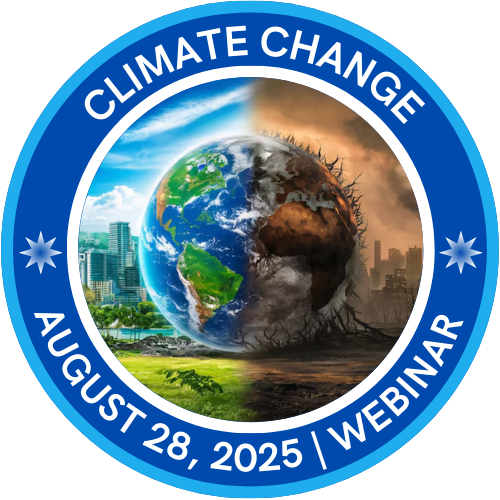Join us on August 28, 2025, for the Webinar on Climate Change, bringing together environmental scientists, researchers, policymakers, and advocates to explore the latest advancements in climate action and sustainable development. This year’s theme, "Disrupting Fossil Fuels with Next-Gen Technologies," will focus on groundbreaking research, policy initiatives, and community-driven strategies to combat climate change and promote global sustainability. Engage in insightful discussions on renewable energy, climate resilience, environmental policy, ecosystem restoration, and the role of technology in climate solutions. Don’t miss this opportunity to connect with global experts, gain valuable insights, and contribute to shaping a more sustainable and resilient future for our planet.
Climate change refers to long-term shifts in temperatures and weather patterns, mainly caused by human activities such as burning fossil fuels, deforestation, and industrial processes. These activities release large amounts of greenhouse gases like carbon dioxide and methane into the atmosphere, trapping heat and warming the planet. While climate change can occur naturally, the rapid changes observed in recent decades are largely due to human influence. Addressing climate change requires immediate and collective global action. Governments, industries, and individuals must work together to reduce carbon emissions, invest in renewable energy, promote sustainable practices, and protect natural resources. Policy changes, technological innovation, and public awareness all play vital roles in tackling this crisis. The choices we make today will determine the health of our planet for future generations.

The Climate Change Consulting market is largely influenced by escalating regulatory demands and governmental initiatives designed to address the impacts of climate change, alongside an increasing recognition of environmental sustainability from both corporations and consumers. As nations pursue ambitious goals for reducing greenhouse gas emissions, organizations are actively seeking professional assistance to ensure compliance and adopt sustainable practices. Furthermore, the emergence of financial risks related to climate issues has driven businesses to incorporate climate factors into their risk management and investment decisions, thereby boosting the need for specialized consulting services. Innovations in technology, particularly in data analytics and modeling tools, empower consultants to devise customized solutions for reducing emissions and enhancing resource efficiency. In addition, initiatives focused on climate change